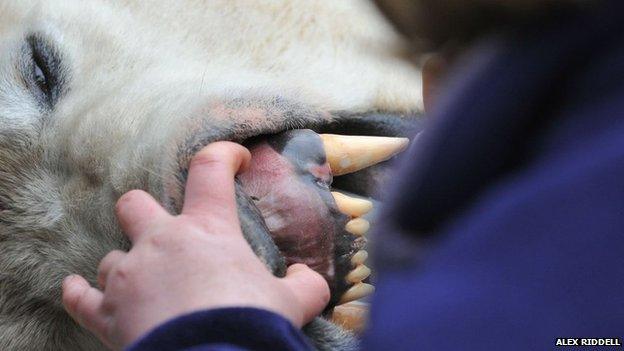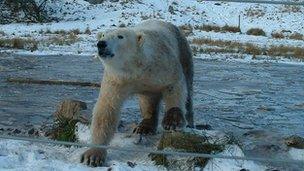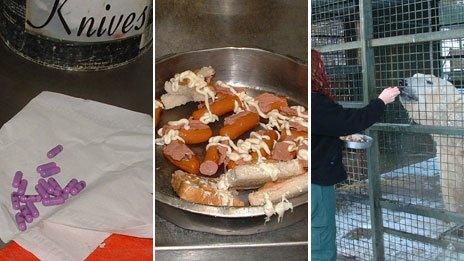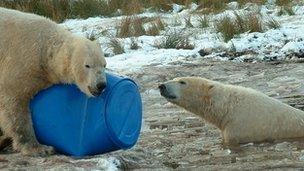How do you give a polar bear a 'medical'?
- Published

One of the polar bears, Arktos, required root canal treatment last year
The only polar bears on public display in the UK are at the Highland Wildlife Park near Aviemore. Looking after them is massive job and they need regular medical check-ups. How do you give polar bears a health check? And why does it require speaking German?
Walker is four, tips the scales at 463kg (72st 12lb) and has been at the park since November 2010, after being introduced from a Dutch zoo.
Arktos is five-years-old, weighs 474kg (74st 12lb) and arrived in April last year from a zoo in Hannover, Germany.
Potentially, the bears could each weigh more than 800kg (125st 12lb) when they become adults.
Since arriving in the Scottish Highlands, both males have required treatment for problems with teeth that, in the wild, could have been fatal.
The dental issues were picked up during regular check-ups.

Play fights
Head keeper Una Richardson is responsible for keeping track of the health of these huge animals.
In a kitchen area at the wildlife keepers' base, she is spiking hotdogs and pate with big purple pills.
The medication is for Arktos, who has the skin complaint contact dermatitis on a few scratches picked up in play fights with Walker.
It took staff a few experiments before coming up with a combination of food and pills Arktos would eat without turning his nose up at it.
Another member of staff pops in to collect some chunks of meat for a family of lynx. Opening the door to a walk-in freezer, she jokes that it is a chance to warm up from the cold outside.
In a sink of boiling water, a bottle of washing-up liquid is thawing out after the contents froze overnight in a gritty, green slush. Outside under the morning's clear blue sky, there is snow on the ground and the temperature is -8C.

Arktos' medication is hidden in treats to make sure he takes it
Una puts her tray of treats in a red plastic sledge and does the rounds.
When she gets to the polar bears, Walker is at the fence with his nose in the air trying to catch a whiff of what is in the sledge.
"We've noticed quite a big difference in the bears' appetite between summer and winter-time," Una says.
"Through the autumn they are packing on a lot of fat for winter and can carry an extra 11.5cm (4.5ins) of fat around their abdomen. Coming into winter, their appetite cuts right down."
The bears share a large open space with a pond. In one corner is a covered area which doubles as a shelter and a safe area for the keepers to examine the pair up close.
Arktos is hand-fed his medication-filled treats and he munches them up.
Una next lobs in their breakfast. Arktos makes a beeline for some big salmon, but Walker spies a prized slab of fat, snatches it from under Arktos's nose and runs off.
Una says: "They have very different personalities.
"We got Walker at a younger age and he's more used to us and very calm and relaxed around us.
"Arktos is a little bit more wary at times and nervous of doors and things like that, but the two of them get on brilliantly. We couldn't have hoped for better."
Root canal
After her morning break, Una returns to the enclosure with another keeper, Robbie. It is now time for the bears' check-up.
Plastic bottles of smelly, yellow cod liver oil and tinned mackerel entice the bears down to the covered area.
Una starts talking to Arktos in German.

The polar bears respond to words, hand gestures and "targets"
On command, the big bear opens his mouth, sits, stands and then lies down with his legs and their dinner plate-sized paws sprawled out. His nose wrinkles as he fishes a morsel of mackerel from Una's fingers.
Una says: "Arktos came to us already with training - in German. He responds to words and hand signals."
"They are not tricks we are asking them to do. The training that we do with the bears is basically for a simple amount of behaviour that allow us to look at them close up and lets us know if there are any problems with them."

Arktos and Walker playing with a plastic barrel
Walker responds to "targets" which are made from lengths of wood and blue plastic.
He opens his mouth as if yawning and, when instructed to stand, he rears up to more than three metres (11ft) on his back legs.
The training to open their mouths was key to staff spotting a rotting upper left canine bothering Arktos last year and a damaged tooth that troubled Walker in 2011.
Arktos required root canal work and Walker an extraction.
At the time of his dental work, Walker was still small and light enough to be operated on an improvised table made from planks of wood laid on straw bales.
For Arktos, however, much thicker planks and builders' scaffolding were needed to take his weight.
Standing, sitting and lying down allows keepers to examine the bears' bodies.
After completing the tasks, the bears lap up the cod liver oil.
Robbie also hefts two big blue empty plastic barrels next to the enclosure's pond.
Arktos and Walker run to their new toys and handle them like a couple of competitors in the World's Strongest Man contest.
Walker rolls his barrel on to the frozen pond and without a moment's hesitation launches himself after it. His body crashes through the ice into the cold water below.
"They love the winter weather," says Una.
She adds: "The other day they were sliding down the snow on their stomachs."
- Published5 January 2013
- Published5 December 2012
- Published2 January 2011